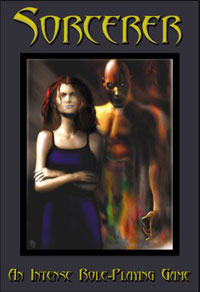The Diana Jones Award is an annual award created to publicly acknowledge excellence in gaming. The award was first made for the year 2000, and the first award ceremony was on August 4, 2001.
More information:
- About the Diana Jones Award
- Nominations & Deadlines
- Contact the Award committee
The Awards:
- The tenth DJ Award (2010)
- The ninth DJ Award (2009)
- The eighth DJ Award (2008)
- The seventh DJ Award (2007)
- The sixth DJ Award (2006)
- The fifth DJ Award (2005)
- The fourth DJ Award (2004)
- The third DJ Award (2003)
- The second DJ Award (2002)
- The first DJ Award (2001)
The Diana Jones Award 2002
The Winner | The Nominees | The Award Ceremony
The Winner

The Diana Jones Award committee is proud to announce that its second annual award is given to Ron Edwards and Sorcerer.
SORCERER
By Ron Edwards
Published by Adept Press
Fresh, mathematically honest, direct, and patently concerned with good game-play, Sorcerer is a marvel of RPG design. First self-published online for as a for-sale PDF, Sorcerer—together with its creator and publisher Ron Edwards—represent the potential of the independent innovator in today’s RPG industry. Now available in hard cover, Sorcerer stands above competitors in elegance and intelligence.
Sorcerer is a rules-light, modern-day RPG about people who control demons (or try to). The game focuses on what the characters want and what they’ll do to get it.
Sorcerer is remarkable for the amount of freedom it provides to (or demands from) gamemasters and players. The game has no setting (no would-be fiction masquerading as world background). The gamemaster determines not just the campaign’s physical and social environment, but also the metaphysical foundation of the game. The GM even determines such central concepts as what demons are and what the Humanity score represents.
The rules of sorcery provide the fixed element in campaign creation, the core around which the campaign is built. The rules allow characters to contact, summon, bind, punish, contain, and banish demons. Each demon has a need, which it is the sorcerer’s responsibility to satisfy.
Sorcerer’s dice-rolling mechanic is a masterstroke. It at once allows any capability or difficulty to be defined by a single number (the number of dice rolled) while still determining success, how strong the success is, and how that success affects other actions.
At every point, Sorcerer boasts details that engage the players in roleplaying their characters more fully. Some roleplaying features are familiar, such as free-form descriptors for a character’s attributes. Others are refreshingly new, such as a character’s ‘kicker’, the startling introductory scene that impels the character into the campaign and that one invents for one’s own character.
In addition to designing Sorcerer, Ron dedicated himself to continuous online playtesting, blazing important landmarks along the trail of electronic games publishing. In the year 2001, Ron’s willingness to put his money where his mouth is by going to hardback, his visible and constant dedication to the craft and art of games design, his tireless encouragement of creator ownership, and his successful nurturing of an online forum dedicated to creator-controlled games have leveraged a mere brilliant game design into the seed crystal of something with the potential to greatly improve adventure gaming.
